Kenya’s Kelvin Kiptum yesterday won the men’s London Marathon in the second-fastest time in history, while the Netherlands’ Sifan Hassan staged a remarkable rally to win the women’s event in the Olympic track champion’s first race over the distance.
Twenty-three-year-old Kiptum broke the course record with an astonishing time of 2 hours, 1 minute, 25 seconds.
Having broken clear of the field, Kiptum — who became the third-fastest male marathon runner of all time on his debut in Valencia in December last year — faded toward the finish and missed Eliud Kipchoge’s world record by 18 seconds.
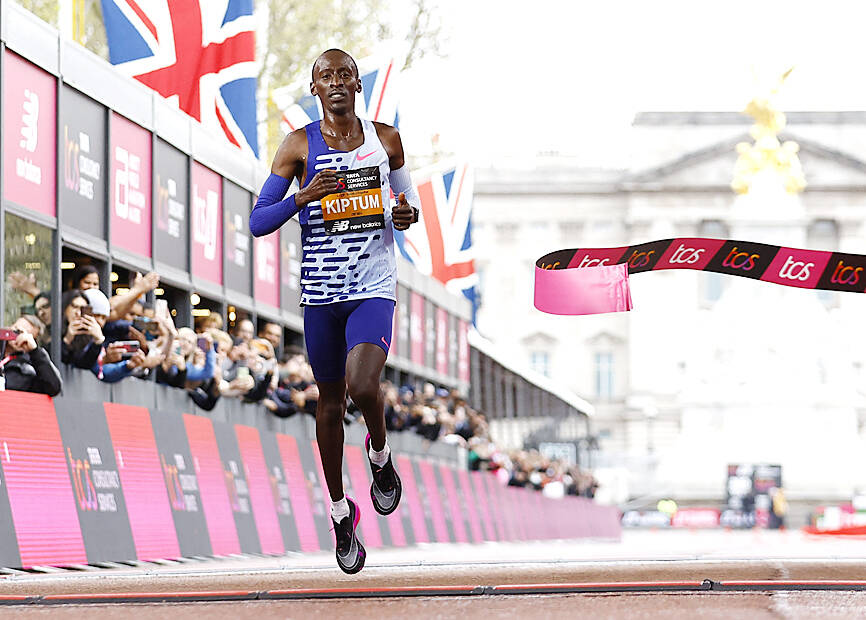
Photo: Reuters
“I am so happy with the result,” Kiptum said. “I don’t know what to say right now, I am just grateful.”
Geoffrey Kamworor made it a Kenyan one-two, finishing second in 2:04.23, with Ethiopia’s Tamirat Tola third in 2:04.59.
British distance great Mo Farah, competing in his last marathon before retiring, finished ninth in 2:10.28.
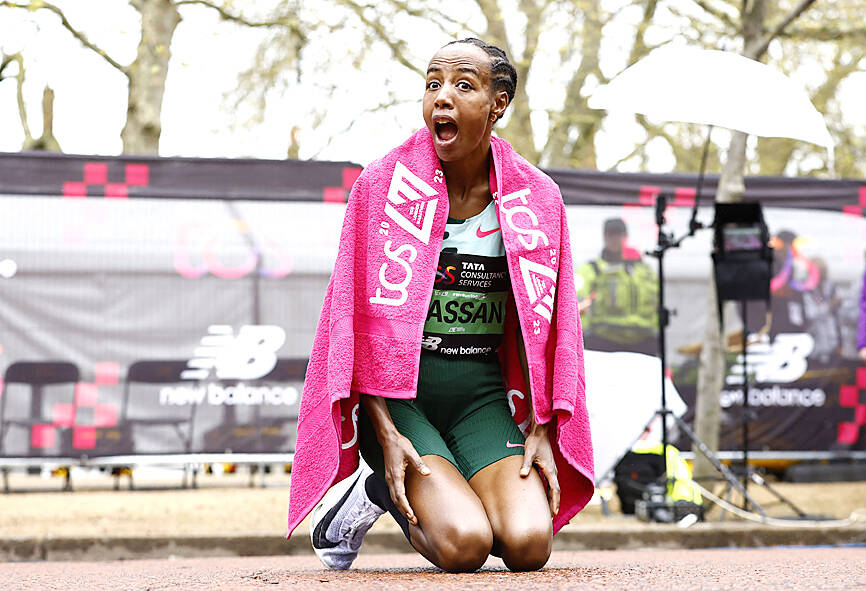
Photo: Reuters
Earlier, it looked as if 30-year-old Hassan’s debut marathon would end in disappointment.
The 5,000m and 10,000m Olympic gold medalist from the COVID-19-delayed 2020 Tokyo Games had been in the leading group, but dropped back and was holding her side after the hour mark.
It would have been impressive enough had the Ethiopian-born Dutch runner — a Muslim who had been fasting due to Ramadan — simply completed the course on the rainswept streets of the British capital, as she then grabbed her hip and stopped to stretch off the injury.
However, Hassan recovered to rejoin the leaders with 4.8km to go.
Despite making a mess of collecting a drink from a water station, she recovered and even offered rival Yalemzerf Yehualaw, last year’s winner, a swig from her bottle.
Hassan then burst clear in a sprint finish to win in a time of 2:18.33.
Kenya’s Alemu Megertu was second in 2:18.37, with compatriot and Olympic champion Peres Jepchirchir third in 2:18.38.
This was the first time Jepchirchir had been defeated in a major marathon race.
“It was just amazing. I never thought I would finish a marathon and here I am winning it,” Hassan told the BBC.
“I had a problem with my hip, which made me stop, but it started to feel a little bit better and then I missed one of the drinks stations,” she said. “I didn’t practice that part of the race because I have been fasting.”
“At 20km I knew that I could kick on, because I didn’t feel that tired and I didn’t care how I finished, I just wanted to get there,” Hassan said. “I wasn’t thinking about winning or how fast I was going to be, and I think that was a good thing for me today.”
Marcel Hug won a fifth men’s wheelchair race in London, just six days after winning the Boston Marathon, with the Swiss star shattering his own course record in a time of 1:23.43.
Australia’s Madison de Rozario, the 2018 champion, won the women’s wheelchair race, edging out four-time champion Manuela Schar in a sprint finish.
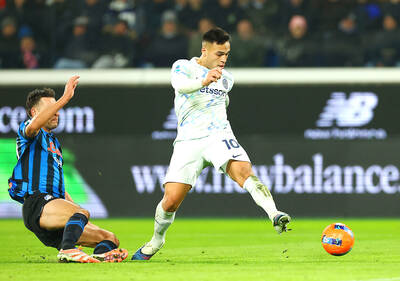
STILL IN THE HUNT: Rasmus Hojlund took his goal tally for SSC Napoli to nine as the champions cruised to a win at US Cremonese and stayed two points behind the leaders Inter on Sunday stayed at the Serie A summit after beating Atalanta BC 1-0 to maintain their slender lead over local rivals AC Milan. Lautaro Martinez netted the only goal of the game in Bergamo for Inter, who lead Milan, 3-0 winners against Hellas Verona thanks to Christoper Nkunku’s first Serie A goals, by a single point at the top of the division. The Argentina striker has scored in four consecutive league matches to end what has been a tricky year in positive style. “I ended last season in a lot of pain... I kept going during the Club World Cup and international
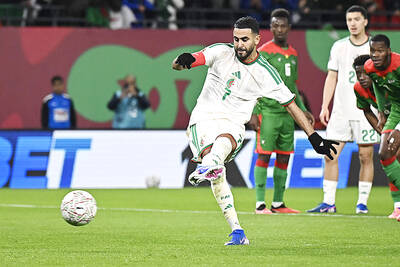
Algeria on Sunday became the third country after Egypt and Nigeria to qualify for the knockout stage of the Africa Cup of Nations by edging Burkina Faso 1-0 in Rabat through a Riyad Mahrez penalty. Defending champions Ivory Coast failed to join the trio after drawing 1-1 with Cameroon in a lively showdown in Marrakesh. Elsewhere, Mozambique ended a 39-match wait for a first victory by beating Gabon 3-2, while Sudan got back into contention for a last-16 slot by beating Equatorial Guinea 1-0 in Casablanca. Captain Mahrez converted from the penalty spot midway through the first half and Algeria then held on

Stan Wawrinka’s 40-year-old legs did not let him down over three-plus hours in his first singles match of a farewell tour yesterday. Three-time Grand Slam singles champion Wawrinka beat Arthur Rinderknech of France, who is ranked 29th to Wawrinka’s 157th, 5-7, 7-6 (5), 7-6 (5). The match went 3 hours, 16 minutes. Wawrinka last month announced that this year would be his last on the ATP tour. “Today was a tough battle ... it’s amazing to come here for the first time, to have so much support,” Wawrinka said yesterday. “Twenty years on tour, you kind of always play in the same place
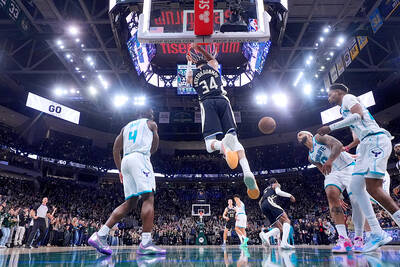
BOUNCING BACK: Antetokounmpo had just returned from an eight-game injury absence last month, leading the Milwaukee Bucks to their third win in four games Giannis Antetokounmpo threw down the game-winning dunk with 4.7 seconds remaining to lift the Milwaukee Bucks to a 122-121 victory over the Charlotte Hornets and grab a slice of NBA history on Friday. The Bucks trailed by as many as 16 on their home floor, but Antetokounmpo scored 12 of his 30 points in the final quarter to help seal the win in a frantic finish that saw five lead changes in the final 45.7 seconds. The two-time NBA Most Valuable Player (MVP) added 10 rebounds and five assists. It was his 158th regular-season game with at least 30 points, 10 rebounds and